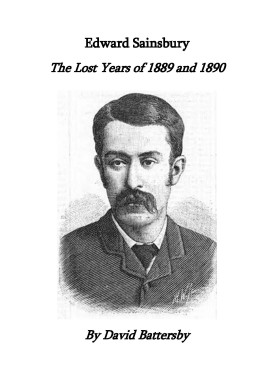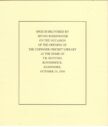Edward Sainsbury
Martin Chandler |Published: 2018
Pages: 12
Author: Battersby, David
Publisher: Battersby, David
Rating: 3 stars

I do wonder sometimes whether other fields of human endeavour throw up this sort publication. It must be the case that these bits of research get done, the more so as digitalisation of old newspapers and archives gathers pace, but does anything other than cricket actually have a market for this kind of thing?
Edward Sainsbury played cricket for Somerset, and was someone whose name meant nothing to me until, a couple of years ago, I read about him in the first part of Stephen Hill’s magnum opus on Somerset cricketers. His was an interesting entry in a book that was chock full of such essays, but still not a name that I was left with any expectation of seeing again.
That I have in fact read of Sainsbury once more is thanks to David Battersby, whose work I have reviewed several times. Initially he was a man who seemed firmly in the (relatively) modern age, with a particular interest in Pakistani cricket and cricketers, but no more. I learned some months ago that he was also just as interested in the cricket of long ago, as his meticulously researched biography of the Gloucestershire professional from WG Grace’s time, Billy Woof amply demonstrates.
Sainsbury played cricket as an amateur, and seems to have been a successful businessman. Indeed his business, and the fact that it meant he wasn’t always available, ultimately cost him the Somerset captaincy in 1888. There was, the detail of which is presumably lost in the mists of time, some ill feeling as a result and Sainsbury, not wanting to play in the ranks, left the county. He then reappeared in Gloucestershire colours in 1891, and played for his second county for two seasons before leaving the First Class game.
What intrigued Battersby was what Sainsbury did in the intervening two years, and the results of his research fill this little booklet. In fact there isn’t too much to it, as Sainsbury played some club cricket whilst waiting to acquire the residential qualification that would allow him to play for Gloucestershire.
Thanks to the relatively easy access to historic newspapers nowadays it has proved possible for Battersby to track Sainsbury over that two year period by virtue of the club cricket in which he played during those two summers, and to follow up a few other threads of information that the reports throw up.
I cannot imagine that too many people who read Edward Sainsbury will not have access to Somerset Cricketers 1882-1919, and Battersby’s research adds an interesting gloss to Hill’s essay. The other thing this pamphlet does is create a desire to learn more about Sainsbury and his family. He seems to have been an interesting man, successfully building a his business which he was therefore able to pass on to his descendants. He had four children, and in 1951 a grandson was selected to play a couple of games for Somerset despite being plainly out of his depth, so there must surely be opportunities for further material being uncovered about the family, and perhaps as I write this review Battersby is already working on a sequel.






Leave a comment